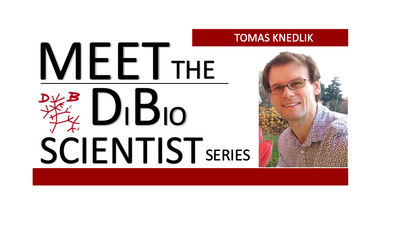
MEET THE DIBIO SCIENTIST SERIES : TOMAS KNEDLIK
Pubblicato il: 17.12.2020 09:14
Tomas is a post-doctoral fellow at DiBio
Can you summarize in few words your research?
My project investigates the contact sites between mitochondria and endoplasmic reticulum (MERCs). They regulate various physiological cell processes, such as calcium and lipid metabolism, and their dysfunction is associated with several disorders, including Parkinson’s and Alzheimer’s diseases. But the precise molecular structure and regulating mechanisms of MERCs are not fully understood and well-described. Therefore, in my project, I am investigating the modulation of the contact sites by small molecules. Using a special microscopy technique, called high-content phenotypic screening, I am identifying bioactive compounds that regulate the function and/or structure of the MERCs. Additionally, I will identify the proteins located within the contact sites that bind the identified bioactive molecules.
What is the most rewarding and the most challenging part of your work?
People outside science usually think that researchers make great and exciting discoveries every week and their work is full of successes. However, I suppose I am not the only one whose experiments usually do not work as expected. So everyday science is also everyday frustration. The tough part (for me) is to stay enthusiastic, positive, not depressed and go on in spite of the bad results. And in the end, you (hopefully) overcome the obstacles and problems and finally reach your goal! That is the rewarding part, because then you can really discover something unexpected and important. This is my source of positive energy and the reason why I became a scientist. Besides that, I also love sharing science and my project results with public, for example at the researchers’ nights or days of open doors.
Tell us your story: what brings you to DiBio?
I did my PhD at the Institute of Organic Chemistry and Biochemistry in Prague, Czechia. My projects contained a lot of protein (bio)chemistry, protein targeting and a little bit of cancer biology. As a result, I co-developed polymer-based antibody mimetics (iBodies) that recognize their target proteins by the inhibitors attached to the polymer backbone. For my postdoc stay, I wanted to try different field and to work on a more biological project. Therefore, I moved to Padova and joined the lab of Marta Giacomello to study the inter-organelle communication and to learn new methods in cell biology. Moreover, I was searching for a position in a nice medium-size city, so Padova was the perfect match!
What’s your favourite “toy” for research – and what can it do?
Generally, I like fluorescent confocal microscopes – even if the experiment goes totally wrong and makes you depressed, you usually get beautiful images at least :-) Here at DiBio, I like the Operetta - it is a fluorescent microscope for high-throughput imaging, so it can analyze up to hundreds or thousands samples – and it works “on its own”! That is amazing! The work, which the Operetta can do overnight for me, would have taken me probably weeks using a normal microscope...
What are your interests outside science?
I love mountains, almost all the sports, traveling, astronomy... Now I am spending all my free time with my family and we are trying to do these activities together. So we travel around Padova and Veneto as much as possible and do hiking in the Alps and sightseeing in more or less nearby towns and villas.





